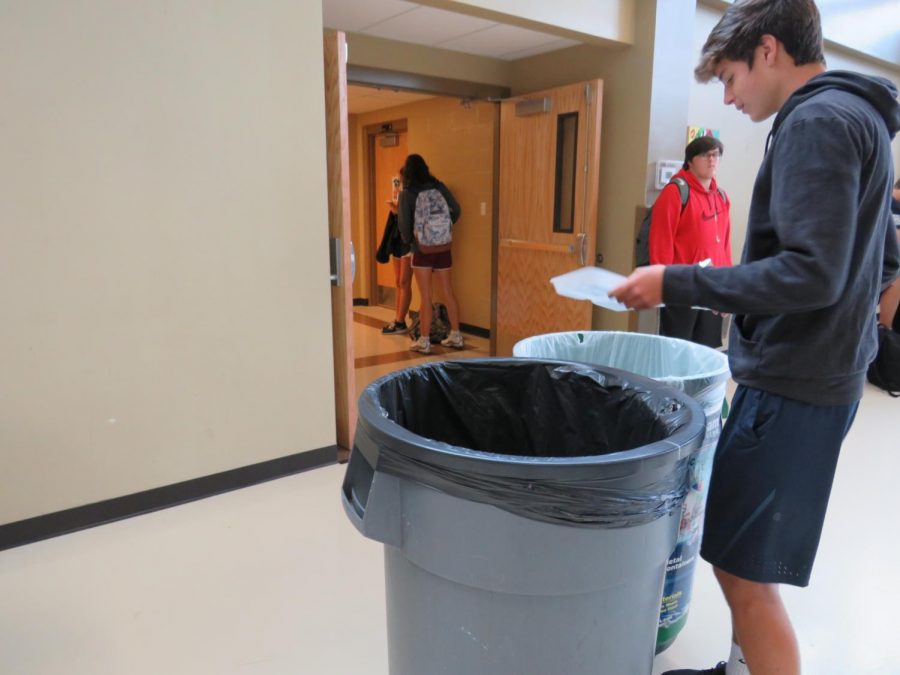Opinion: When it comes to recycling, how does Windsor compare to New Zealand?
Leah Parsons, who is a foreign exchange student from New Zealand, discusses how Windsor compares to her home country when it comes to recycling.
September 6, 2019
Everyone thinks New Zealand is this beautiful country with scenic landscapes and a “clean and green” catch phrase. But do schools in New Zealand stand up to Windsor’s eco-friendly choices?
As a foreign exchange student (from New Zealand of course), coming to an American high school has been quite the change.
One of the first things I noticed was all the posters around the school, exclaiming different environmentally friendly choices. But I wanted to figure out if these choices were truly being followed throughout the school.
Focusing specifically on the Recycling Program for Windsor, I talked to teacher Laura Ward.
Ward believes that recycling teaches students things like conservation, reusing, repurposing and what to keep out of landfills. Recycling is also an easy way for people to start their eco-friendly process as it is easy and a common action to do.
Ward also mentioned numerous actions done by the school in order to achieve an eco-friendly environment at Windsor, including things like a styrofoam drive, the Benches for Caps program, the school garden and giving up one item for a certain period of time.
For example, Ward gave up straws, which then led an example for other students to follow.
“I feel like, and other schools have told me, that we are above and beyond what other districts are doing,” Ward said.
But not everything is perfect.
“We can do better…We can all do better,” Ward said.
It seemed that despite the numerous amount of actions taken by the school, more needed to be done.
She feels as though the role sometimes isn’t taken as seriously as it should be.
“People don’t like change. They like things to be the same all the time,” Ward said.
And, unfortunately, this is the case for a lot of people.
Climate change is currently a massive global topic. Politicians worldwide are debating what their countries should be doing differently in order to tackle this issue.
In New Zealand, for example, we have recently banned all single-use plastic bags nationwide. We are also trying to tackle our part in the Zero Carbon Emissions goal.
My home school deals with environmental issues, but it doesn’t seem to be as intensely as Windsor, which I find to be quite interesting and I believe we could be following some of Windsor’s leads.
Back home, we tend to focus more on the littering side of things. Every school day, a group of students are randomly picked to help clean up. These students then have to pick up the rubbish around the school.
We do have recycling bins, but they aren’t monitored as intensely as at Windsor. We also have gardens, but they’re for the horticulture class, not the whole school.
I do find interesting,though, that my school back home has more of a set policy around eco-friendly learning and doing, whereas I was unable to find one for Windsor.
The policy is titled the ‘Education for Sustainability Policy’, and it covers information surrounding Physical, Social and Economic Sustainability.
It also includes six points, including one that states: “The school will reduce its impact on the environment through practices such as recycling, reducing energy usage, promoting biodiversity and making environmentally positive purchases.”
Perhaps having a set policy around sustainability and the environment could help improve the amount of support at Windsor.
Despite my school back home not taking recycling as seriously as it should, the local area of Selwyn certainly does.
The council website states that they must provide people with recycling options, and everyone in my area at home owns three different bins: yellow recycling bin, red waste bin and a green compost bin.
My school back home could definitely take away some ideas from Windsor. Meanwhile, Missouri, or Jefferson County more specifically, could take some ideas away from New Zealand.
We can all help each other in this battle against pollution and climate change because soon there may not be a future to fight for.
As Greta Thunberg said, “What you do now, we children can’t undo in the future. So please, treat the crisis as the crisis it is and give us a future.”




